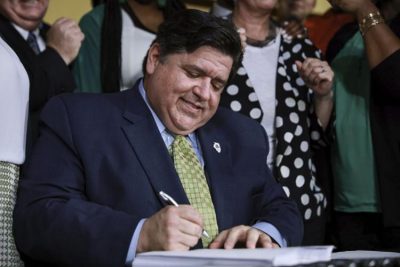Governor J.B. Pritzker announced the signing of 3 bills reforming education and juvenile justice in the state yesterday.
The first law will seek to end the use of physical restraints to discipline students in public schools. The legislation, which received wide bipartisan support, aims to eliminate solitary time out and other restrictive interventions within three years, while expanding training and accountability in schools as it relates to these practices.
The bill bans prone restraint. It may only be permitted for use as an emergency measure until the end of the 2021-22 school year. The bill also prohibits the use of medical and chemical restraint. The legislation ensures that timeouts, isolated timeouts, and other forms of physical restraint may only be used if a student’s behavior is an imminent danger to the individual student or to others, and the school staff member applying the invention tactic must be trained in its safe application. The law takes effect immediately.
The second bill prohibits schools from issuing policies on hairstyles historically associated with race or ethnicity. It also addresses dress code biases towards people of color, especially in regards to hairstyles. The bill prohibits school uniform and dress code policies from restricting hairstyles that have been historically associated with race, ethnicity, or hair texture. This may include, but is not limited to, braids, locks, and twists. The bill requires the Illinois State Board of Education to provide schools with educational resource materials to teach about protective hairstyles. The bill was written after 4 year old Jett Hawkins of Chicago was told his braids were in violation of the school dress code.
Lieutenant Governor Juliana Stratton said during the bill signing yesterday that school children should no longer be discriminated against for the way they wear their hair: “For generations hair styles and textures were used to shame and belittle, to discipline and degrade; and it’s really unbelievable to me that in 2021, we are still fighting policies in our schools that harm, shame, and discriminate against – in particular, black children, because of how they wear their hair.”
The bill goes into effect January 1st.
The third bill involves reforming juvenile justice by reducing mandatory minimum sentences, among other changes in the Illinois Department of Juvenile Justice.
House Bill 3513, also known as the Procedural Justice for Youth Act, removes mandatory penalties that create longer sentences for younger teens than for older youth who commit the same crimes. In one change, youth given the label of habitual juvenile offender or violent offender will receive a proportionate extension to their stay in the Illinois Department of Juvenile Justice and will no longer be committed until age 21. Concurrent sentencing has been clarified so calculating sentences is uniformly done for youth across Illinois.
The bill also makes operational changes allowing IDJJ to align with national practice standards. IDJJ is now not allowed to use isolation or room confinement as a punishment in response to youth behavior in their institutions. The bill takes effect immediately.




